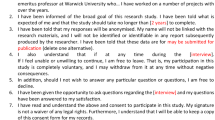Abstract
In order to draw some attention to the subject of business ethics and to achieve the inclusion of business ethics into the official curricula of the sixth form courses in secondary schools in Flanders, the Flemish Network for Business Ethics set up a pilot project. It includes about twelve lessons. The main object is to teach students how to cope with an ethical problem. Therefore an educational map has been edited – titled Ethics ...none of my business? (Siebens, 1998) – in which a procedure to handle an ethical problem is proposed. The procedure rests on the stakeholders-approach (Freeman, 1984). Other theoretical items are: ethical intuition, traditional moral norms and communication, a procedure approach, the limitation of acting, and the metaphysical basis (especially the existentialistic philosophy of Lévinas).
The basic procedure contains four steps. But the map makes a distinction between a procedure for a ‘choice’ directed situation and a procedure for an ‘evaluation’ directed situation. The subject of the project is business ethics, but the organizing commission hopes the students will learn to look at their entire world from an ethical angle. Because real ethical intuition hasn't to do with external hierarchical power and regulation but with selfregulation, argumentative authority and internalized values and principles.
Similar content being viewed by others
REFERENCES
Bishop, T. B.: 1992, ‘Integrating Business Ethics into an Undergraduate Curriculum’, Journal of Business Ethics 11, 291–299.
Blickle, G. and A. Löhr: 1995, The Moral Dimension of Recent Organisation Concepts, paper at the EBEN-Conference '95, Enschede.
Bonnici, J. and R. S. Glass: ‘An Experiential Approach for Teaching Business Ethics’, Teaching Business Ethics 1, 183–195.
Burggraeve, R.: 1995, From Self-Development to Solidarity, Peeters, Leuven.
Colette, J.: 1994, L'Existentialisme, Presses Universitaires de France, Paris.
Etzioni, A.: 1988, The Moral Dimension. Toward a New Economics, Free Press, New-York.
Falise, M.: 1991, ‘Een christelijke economie?’, in J. A. Selling (ed.), Christenen en samenleving, Kok, Kampen, pp. 173–184.
Freeman, R.: 1984, Strategic Management: a Stakeholder-approach, Pitman, Marshfield Mass.
Key, S.: 1997, ‘An Inquiry into the Case Method’, Teaching Business Ethics 1, 197–211.
Klaassen, C.: 1996, Socialisatie en moraal. Onderwijs en waarden in een laat-moderne tijd. Garant, Leuven.
Lebacqz, K.: 1986, Professional Ethics. Power and Paradox, Abingdon Press, Nassville.
Lévinas, E.: 1930, Théorie de l'intuition dans la phénoménologie de Husserl, Librairie Philosophique J. Vrin, Paris.
Lévinas, E.: 1961, Totalité et infini, La Haye, Paris.
Lévinas, E.: 1982, Ethique et infini, Librairie Arthème Fayard et Radio France, Paris.
Mac Coy, C.: 1985, Management of Values. The Ethical Difference in Corporate Policy and Performance, Pitman, Marshfield Mass.
MacIntyre, A.: 1981, After Virtue, University of Notre Dame, Notre Dame.
Maslow, A.: 1954, Motivation and Personality, Harper & Row, New-York.
Rawls, J.: 1972, A Theory of Justice, University Press, Oxford.
Sen, A.: 1987, On Ethics and Economics, Blackwell, Oxford.
Sen, A.: 1992, Inequality Re-examined, Clarendon Press, Oxford.
Siebens, H.: 1997, Zakenethiek, Garant, Leuven.
Siebens, H.: 1996, Stress op het werk, Garant, Leuven.
Siebens, H.: 1997, Ethiek... heb ik daar zaken mee?, Rotary Clubs Aalst en Aalst Noord.
Sillanpää, M. and D. Wheeler: 1997, The Stakeholder Corporation. A Blueprint for Maximizing Stakeholder Value, Pitman, London.
Vandenbroucke, F.: 1990, Over dromen en mensen, Davidsfonds, Leuven.
van Willigenburg, Th.: 1991, Inside the Ethical Expert, Pharos, Kampen.
Author information
Authors and Affiliations
Rights and permissions
About this article
Cite this article
Siebens, H. Using Stakeholder-Theory into Case-Method. Teaching Business Ethics 1, 353–368 (1997). https://doi.org/10.1023/A:1009717721293
Issue Date:
DOI: https://doi.org/10.1023/A:1009717721293




